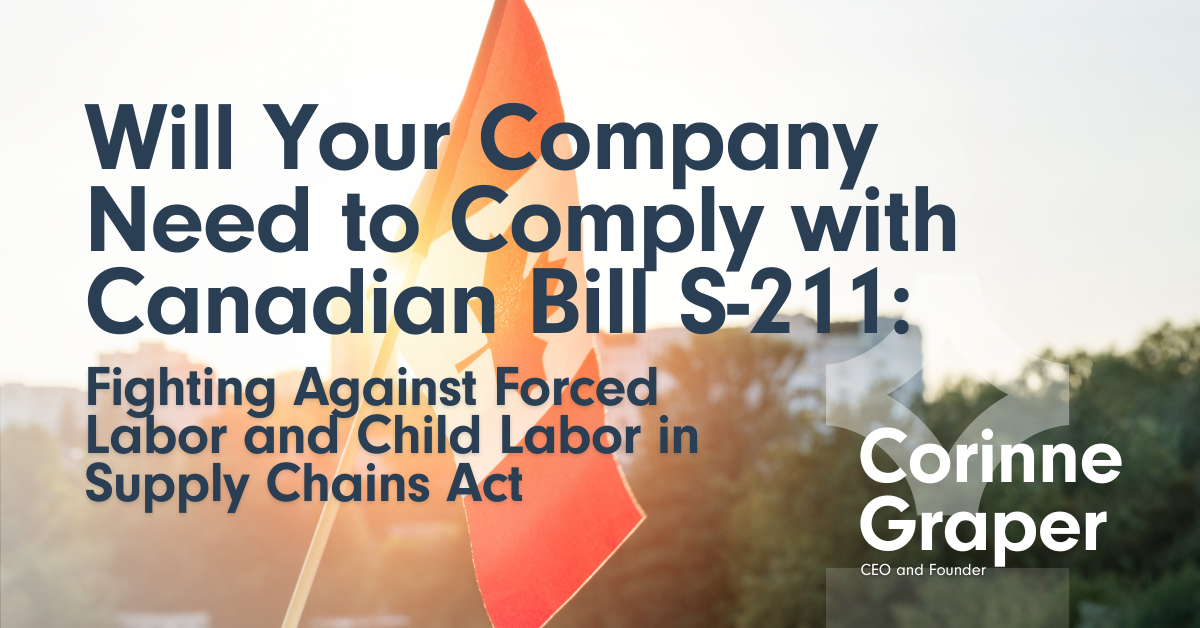Will Your Company Need to Comply with Canadian Bill S-211: Fighting Against Forced Labor and Child Labor in Supply Chains Act
If your company has operations in Canada it is possible that the new Canadian human rights law, the Fighting Against Forced Labor and Child Labor in Supply Chains Act, may impact your supply chain.
One of the most relevant requirements of the new bill is to require eligible companies to write an annual report outlining the steps taken to prevent, reduce and eliminate risk regarding forced and child labor in their supply chains by May 31 of each year.
Canadian Bill S-211 is expected to go into effect on January 1, 2024 with the first reporting deadline as soon as May 2024.
What Companies Need to Comply with Canadian Bill S-211?
Companies that are required to engage with this Bill include companies that:
Are listed on a stock exchange in Canada, and/or
Have a place of business in Canada, do business in Canada, or have assets in Canada that include at least two of the following
At least $200 million in assets
At least $40 million in revenue, or
Employ an average of at least 250 employees.
What Information Must Be Included in the Annual Report?
The annual reports required to inform the public about efforts to prevent and reduce the risk of forced labor and child labor must include information about your company’s:
Structures, activities and supply chains;
Policies and due diligence processes related to forced and child labor;
Potential risks related to forced and child labor and steps taken to assess and manage those risks;
Steps taken to remediate any forced or child labor;
Steps taken to remediate affected individuals for the loss of income that would incur if forced labor and child labor were eliminated in their supply chains;
Training provided to employees on forced and child labor; and
Measurement and evaluation mechanisms for the company’s progress regarding forced and child labor.
What are the Consequences of Non-Compliance?
If your company is required to engage with the new bill and chooses not to comply with the Bill’s requirements, you could be penalized with a fine of up to $250,000. If your company (and/or high executive employees) makes any false or misleading claims related to compliance, there is risk to be judicially penalized under Canadian law.
Penalties from non-compliance are focused on directors, officers, or agents of the company and do not extend to employees.
Conclusion
Supply chain transparency is a critical aspect of any company's environmental, social, and governance (ESG) framework, but you can’t know the issues or risks within your supply chain unless you look for them.
Identifying risks in your supply chain is a crucial first step in order to find the solutions necessary to mitigate the risks and implement robust governance measures to prevent potential violations. Ensuring that the appropriate governance structures are in place within your supply chain to identify and mitigate risks requires a proactive approach and that is not only good business, but responsible business.
Uplift works with clients across ESG issues, including using our extensive expertise in human rights due diligence and forced labor compliance to help companies work through these issues.
Need help understanding how this new law may impact your company?
Do you need help with designing and implementing a successful HRDD Program?
Do you need help understanding how to comply with the new Bill?
Reach out to us today and we can help.
The Uplift Agency
Uplift builds strategies, programs, and communication campaigns that advance ESG in workplaces, supply chains and communities.
We know how to navigate the road ahead because we’ve already been down it – 90 percent of our team has led environmental or social programs in corporations or nonprofits. Because ESG is all we do, our services are more comprehensive and integrated than most firms.


